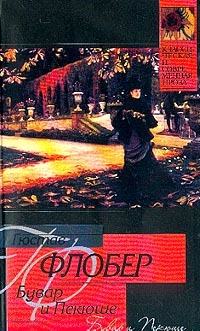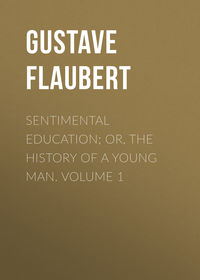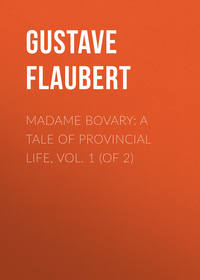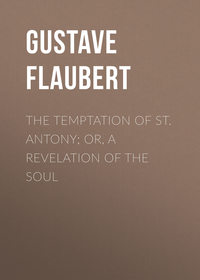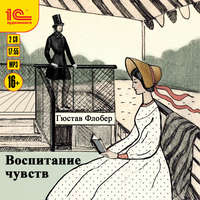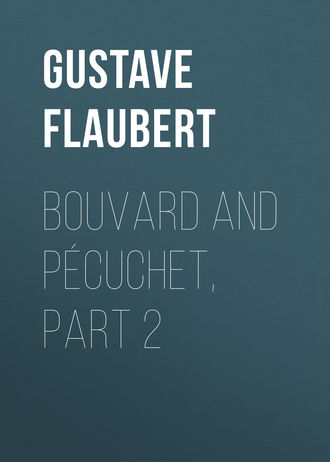 полная версия
полная версияBouvard and Pécuchet, part 2
Then it was the turn of the great personages.
The first on the gospel-side was Pécuchet; but, too much moved, no doubt, he kept swaying his head right and left. The curé found difficulty in putting the host into his mouth, and as he received it he turned up the whites of his eyes.
Bouvard, on the contrary, opened his jaws so widely, that his tongue hung over his lip like a streamer. On rising he jostled against Madame Bordin. Their eyes met. She smiled; without knowing the reason why, he reddened.
After Madame Bordin, Mademoiselle de Faverges, the countess, their lady companion, and a gentleman who was not known at Chavignolles approached the altar in a body.
The last two were Placquevent and Petit, the schoolmaster, and then, all of a sudden, Gorju made his appearance. He had got rid of the tuft on his chin; and, as he went back to his place, he had his arms crossed over his breast in a very edifying fashion.
The curé harangued the little boys. Let them take care later on in life not to act like Judas, who betrayed his God, but to preserve always their robe of innocence.
Pécuchet was regretting his when there was a sudden moving of the seats: the mothers were impatient to embrace their children.
The parishioners, on their way out, exchanged felicitations. Some shed tears. Madame de Faverges, while waiting for her carriage, turned round towards Bouvard and Pécuchet, and presented her future son-in-law: “Baron de Mahurot, engineer.” The count was sorry not to have the pleasure of their company. He would return the following week. “Pray bear it in mind.”
The carriage having now come up, the ladies of the château departed, and the throng dispersed.
They found a parcel inside their own grounds in the middle of the grass. The postman, as the house had been shut up, had thrown it over the wall. It was the work which Barberou had promised to send, Examination of Christianity, by Louis Hervieu, a former pupil of the Normal School. Pécuchet would have nothing to say to it, and Bouvard had no desire to make himself acquainted with it.
He had been repeatedly told that the sacrament would transform him. For several days he awaited its blossomings in his conscience. He remained the same as ever, and a painful astonishment took possession of him.
What! The Flesh of God mingles with our flesh, and it produces no effect there! The Thought which governs the world does not illuminate our spirits! The Supreme Power abandons us to impotence!
M. Jeufroy, while reassuring him, prescribed for him the catechism of the Abbé Gaume.
On the other hand, Pécuchet’s devotion had become developed. He would have liked to communicate under two species, kept singing psalms as he walked along the corridor, and stopped the people of Chavignolles to argue with, and to convert them. Vaucorbeil laughed in his face; Girbal shrugged his shoulders; and the captain called him “Tartuffe.”
It was now thought that they were going too far.
It is an excellent custom to consider things as so many symbols. If the thunder rumbles, imagine to yourself the Last Judgment; at sight of a cloudless sky, think of the abode of the blessed; say to yourself in your walks that every step brings you nearer to death. Pécuchet observed this method. When he took hold of his clothes, he thought of the carnal envelope in which the Second Person of the Trinity was clad; the ticking of the clock recalled to him the beatings of His heart, and the prick of a pin the nails of the Cross. But in vain did he remain on his knees for hours and multiply his fasts and strain his imagination. He did not succeed in getting detached from self; it was impossible to attain to perfect contemplation.
He had recourse to mystic authors: St. Theresa, John of the Cross, Louis of Granada, Simpoli, and, of the more modern, Monseigneur Chaillot. Instead of the sublimities which he expected, he encountered only platitudes, a very disjointed style, frigid imagery, and many comparisons drawn from lapidaries’ shops.
He learned, however, that there is an active purgation and a passive purgation, an internal vision and an external vision, four kinds of prayers, nine excellencies in love, six degrees in humility, and that the wounding of the soul is not very different from spiritual theft.
Some points embarrassed him.
“Since the flesh is accursed, how is it that we are bound to thank God for the boon of existence?” “What proportion must be observed between the fear indispensable to the salvation and the hope which is no less so?” “Where is the sign of grace?” etc.
M. Jeufroy’s answers were simple.
“Don’t worry yourself. By desiring to sift everything we rush along a perilous slope.”
The Catechism of Perseverance, by Gaume, had disgusted Pécuchet so much that he took up Louis Hervieu’s book. It was a summary of modern exegesis, prohibited by the government. Barberou, as a republican, had bought the book.
It awakened doubts in Bouvard’s mind, and, first of all, on original sin. “If God had created man peccable, He ought not to punish him; and evil is anterior to the Fall, since there were already volcanoes and wild beasts. In short, this dogma upsets my notions of justice.”
“What would you have?” said the curé. “It is one of those truths about which everybody is agreed, without being able to furnish proofs of it; and we ourselves make the crimes of their fathers rebound on the children. Thus morality and law justify this decree of Providence, since we find it in nature.”
Bouvard shook his head. He had also doubts about hell.
“For every punishment should look to the amelioration of the guilty person, which is impossible where the penalty is eternal; and how many are enduring it? Just think! All the ancients, the Jews, the Mussulmans, the idolaters, the heretics, and the children who have died without baptism – those children created by God, and for what end? – for the purpose of being punished for a sin which they did not commit!”
“Such is St. Augustine’s opinion,” added the curé; “and St. Fulgentius involves even the unborn child in damnation. The Church, it is true, has come to no decision on this matter. One remark, however. It is not God, but the sinner who damns himself; and the offence being infinite, since God is infinite, the punishment must be infinite. Is that all, sir?”
“Explain the Trinity to me,” said Bouvard.
“With pleasure. Let us take a comparison: the three sides of a triangle, or rather our soul, which contains being, knowing, and willing; what we call faculty in the case of man is person in God. There is the mystery.”
“But the three sides of the triangle are not each the triangle; these three faculties of the soul do not make three souls, and your persons of the Trinity are three Gods.”
“Blasphemy!”
“So then there is only one person, one God, one substance affected in three ways!”
“Let us adore without understanding,” said the curé.
“Be it so,” said Bouvard. He was afraid of being taken for an atheist, and getting into bad odour at the château.
They now visited there three times a week, about five o’clock in winter, and the cup of tea warmed them. The count’s manners recalled the ease of the ancient court; the countess, placid and plump, exhibited much discernment about everything. Mademoiselle Yolande, their daughter, was the type of the young person, the angel of “keepsakes”; and Madame de Noares, their lady companion, resembled Pécuchet in having a pointed nose like him.
The first time they entered the drawing-room she was defending somebody.
“I assure you he is changed. His gift is a proof of it.”
This somebody was Gorju. He had made the betrothed couple an offer of a Gothic prie-dieu. It was brought. The arms of the two houses appeared on it in coloured relief. M. de Mahurot seemed satisfied with it, and Madame de Noares said to him:
“You will remember my protégés?”
Then she brought in two children, a boy of a dozen years and his sister, who was perhaps ten. Through the holes in their rags could be seen their limbs, reddened with cold. The one was shod in old slippers, the other wore only one wooden shoe. Their foreheads disappeared under their hair, and they stared around them with burning eyeballs like famished wolves.
Madame de Noares told how she had met them that morning on the high-road. Placquevent could not give any information about them.
They were asked their names.
“Victor – Victorine.”
“Where was their father?’
“In jail.”
“And what was he doing before that?”
“Nothing.”
“Their country?”
“St. Pierre.”
“But which St. Pierre?”
The two little ones for sole response, said, snivelling:
“Don’t know – don’t know.”
Their mother was dead, and they were begging.
Madame de Noares explained how dangerous it would be to abandon them; she moved the countess, piqued the count’s sense of honour, was backed up by mademoiselle, pressed the matter – succeeded.
The gamekeeper’s wife would take charge of them. Later, work would be found for them, and, as they did not know how to read or write, Madame de Noares gave them lessons herself, with a view to preparing them for catechism.
When M. Jeufroy used to come to the château, the two youngsters would be sent for; he would question them, and then deliver a lecture, into which he would import a certain amount of display on account of his audience.
On one occasion, when the abbé had discoursed about the patriarchs, Bouvard, on the way home with him and Pécuchet, disparaged them very much.
“Jacob is notorious for his thieveries, David for his murders, Solomon for his debaucheries.”
The abbé replied that we should look further into the matter. Abraham’s sacrifice is a prefigurement of the Passion; Jacob is another type of the Messiah, just like Joseph, like the Brazen Serpent, like Moses.
“Do you believe,” said Bouvard, “that he composed the ‘Pentateuch’?”
“Yes, no doubt.”
“And yet his death is recorded in it; the same observation applies to Joshua; and, as for the Judges, the author informs us that, at the period whose history he was writing, Israel had not yet kings. The work was, therefore, written under the Kings. The Prophets, too, astonish me.”
“He’s going to deny the Prophets now!”
“Not at all! but their overheated imagination saw Jehovah under different forms – that of a fire, of a bush, of an old man, of a dove; and they were not certain of revelation since they are always asking for a sign.”
“Ha! and where have you found out these nice things?”
“In Spinoza.”
At this word, the curé jumped.
“Have you read him?”
“God forbid!”
“Nevertheless, sir, science – ”
“Sir, no one can be a scholar without being a Christian.”
Science furnished a subject for sarcasms on his part:
“Will it make an ear of corn sprout, this science of yours? What do we know?” he said.
But he did know that the world was created for us; he did know that archangels are above the angels; he did know that the human body will rise again such as it was about the age of thirty.
His ecclesiastical self-complacency provoked Bouvard, who, through want of confidence in Louis Hervieu, had written to Varlot; and Pécuchet, better informed, asked M. Jeufroy for explanations of Scripture.
The six days of Genesis mean six great epochs. The pillage of the precious vessels made by the Jews from the Egyptians must be interpreted to mean intellectual riches, the arts of which they had stolen the secret. Isaiah did not strip himself completely, nudus in Latin signifying “up to the hips”: thus Virgil advises people to go naked in order to plough, and that writer would not have given a precept opposed to decency. Ezekiel devouring a book has nothing extraordinary in it; do we not speak of devouring a pamphlet, a newspaper?
“But if we see metaphors everywhere, what will become of the facts?”
The abbé maintained, nevertheless, that they were realities.
This way of understanding them appeared disloyal to Pécuchet. He pushed his investigations further, and brought a note on the contradictions of the Bible.
“Exodus teaches us that for forty years they offered up sacrifices in the desert; according to Amos and Jeremiah they offered up none. Paralipomenon and the book of Esdras are not in agreement as to the enumeration of the people. In Deuteronomy, Moses saw the Lord face to face; according to Exodus, he could not see Him. Where, then, is the inspiration?”
“An additional ground for admitting it,” replied M. Jeufroy smiling. “Impostors have need of connivance; the sincere take no such precautions. In perplexity, have recourse to the Church. She is always infallible.”
“On whom does her infallibility depend?”
“The Councils of Basle and of Constance attribute it to the councils. But often the councils are at variance – witness that which decided in favour of Athanasius and of Arius; those of Florence and Lateran award it to the Pope.”
“But Adrian VI. declares that the Pope may be mistaken, like any other person.”
“Quibbles! All that does not affect the permanence of dogma.”
“Louis Hervieu’s work points out the variations: baptism was formerly reserved for adults, extreme unction was not a sacrament till the ninth century, the Real Presence was decreed in the eighth, purgatory recognised in the fifteenth, the Immaculate Conception is a thing of yesterday.”
And so it came to pass that Pécuchet did not know what to think of Jesus. Three Evangelists make him out to be a man. In one passage of St. John he appears to be equal to God; in another, all the same, to acknowledge himself His inferior.
The abbé rejoined by citing the letter of King Abgar, the acts of Pilate, and the testimony of the sibyls, “the foundation of which is genuine.” He found the Virgin again amongst the Gauls, the announcement of a Redeemer in China, the Trinity everywhere, the Cross on the cap of the Grand Lama, and in Egypt in the closed hands of the gods; and he even exhibited an engraving representing a nilometer, which, according to Pécuchet, was a phallus.
M. Jeufroy secretly consulted his friend Pruneau, who searched for proofs for him in the authors. A conflict of erudition was waged, and, lashed by conceit, Pécuchet became abstruse, mythological. He compared the Virgin to Isis, the Eucharist to the Homa of the Persians, Bacchus to Moses, Noah’s ark to the ship of Xithurus. These analogies demonstrated to his satisfaction the identity of religions.
But there cannot be several religions, since there is only one God. And when he was at the end of his arguments, the man in the cassock exclaimed: “It is a mystery!”
“What is the meaning of that word? Want of knowledge: very good. But if it denotes a thing the mere statement of which involves contradiction, it is a piece of stupidity.”
And now Pécuchet would never let M. Jeufroy alone. He would surprise him in the garden, wait for him in the confessional, and take up the argument again in the sacristy.
The priest had to invent plans in order to escape from him.
One day, after he had started for Sassetot on a sick call, Pécuchet proceeded along the road in front of him in such a way as to render conversation inevitable.
It was an evening about the end of August. The red sky began to darken, and a large cloud lowered above them, regular at the base and forming volutes at the top.
Pécuchet at first talked about indifferent subjects, then, having slipped out the word “martyr”:
“How many do you think there were of them?”
“A score of millions at least.”
“Their number is not so great, according to Origen.”
“Origen, you know, is open to suspicion.”
A big gust of wind swept past, violently shaking the grass beside the ditches and the two rows of young elm trees that stretched towards the end of the horizon.
Pécuchet went on:
“Amongst the martyrs we include many Gaulish bishops killed while resisting the barbarians, which is no longer the question at issue.”
“Do you wish to defend the emperors?”
According to Pécuchet, they had been calumniated.
“The history of the Theban legion is a fable. I also question Symphorosa and her seven sons, Felicitas and her seven daughters, and the seven virgins of Ancyra condemned to violation, though septuagenarians, and the eleven thousand virgins of St. Ursula, of whom one companion was called Undecemilla, a name taken for a figure; still more, the ten martyrs of Alexandria!”
“And yet – and yet they are found in authors worthy of credit.”
Raindrops fell, and the curé unrolled his umbrella; and Pécuchet, when he was under it, went so far as to maintain that the Catholics had made more martyrs than the Jews, the Mussulmans, the Protestants, and the Freethinkers – than all those of Rome in former days.
The priest exclaimed:
“But we find ten persecutions from the reign of Nero to that of Cæsar Galba!”
“Well! and the massacres of the Albigenses? and St. Bartholomew? and the revocation of the Edict of Nantes?”
“Deplorable excesses, no doubt; but you do not mean to compare these people to St. Étienne, St. Lawrence, Cyprian, Polycarp, a crowd of missionaries?”
“Excuse me! I will remind you of Hypatia, Jerome of Prague, John Huss, Bruno, Vanini, Anne Dubourg!”
The rain increased, and its drops dashed down with such force that they rebounded from the ground like little white rockets.
Pécuchet and M. Jeufroy walked on slowly, pressed close to one another, and the curé said:
“After abominable tortures they were flung into vessels of boiling water.”
“The Inquisition made use of the same kind of torture, and it burned very well for you.”
“Illustrious ladies were exhibited to the public gaze in the lupanars.”
“Do you believe Louis XIV.’s dragoons regarded decency?”
“And mark well that the Christians had done nothing against the State.”
“No more had the Huguenots.”
The wind swept the rain into the air. It clattered on the leaves, trickled at the side of the road; and the mud-coloured sky intermingled with the fields, which lay bare after the close of harvest. Not a root was to be seen. Only, in the distance, a shepherd’s hut.
Pécuchet’s thin overcoat had no longer a dry thread in it. The water ran along his spine, got into his boots, into his ears, into his eyes, in spite of the Amoros headpiece. The curé, while lifting up with one hand the tail of his cassock, uncovered his legs; and the points of his three-cornered hat sputtered the water over his shoulders, like the gargoyles of a cathedral.
They had to stop, and, turning their backs to the storm, they remained face to face, belly to belly, holding with their four hands the swaying umbrella.
M. Jeufroy had not interrupted his vindication of the Catholics.
“Did they crucify your Protestants, as was done to St. Simeon; or get a man devoured by two tigers, as happened to St. Ignatius?”
“But make some allowance for the number of women separated from their husbands, children snatched from their mothers, and the exile of the poor across the snow, in the midst of precipices. They huddled them together in prisons; just when they were at the point of death they were dragged along on the hurdle.”
The abbé sneered. “You will allow me not to believe a word of it. And our martyrs are less doubtful. St. Blandina was delivered over naked in a net to a furious cow. St. Julia was beaten to death. St. Taracus, St. Probus, and St. Andronicus had their teeth broken with a hammer, their sides torn with iron combs, their hands pierced with reddened nails, and their scalps carried off.”
“You are exaggerating,” said Pécuchet. “The death of the martyrs was at that time an amplification of rhetoric.”
“What! of rhetoric?”
“Why, yes; whilst what I relate to you, sir, is history. The Catholics in Ireland disembowelled pregnant women in order to take their children – ”
“Never!”
“ – and give them to the pigs.”
“Come now!”
“In Belgium they buried women alive.”
“What nonsense!”
“We have their names.”
“And even so,” objected the priest, angrily shaking his umbrella, “they cannot be called martyrs. There are no martyrs outside the Church.”
“One word. If the value of a martyr depends on the doctrine, how could he serve to demonstrate its existence?”
The rain ceased; they did not speak again till they reached the village. But, on the threshold of the presbytery, the curé said:
“I pity you! really, I pity you!”
Pécuchet immediately told Bouvard about the wrangle. It had filled him with an antipathy to religion, and, an hour later, seated before a brushwood fire, they both read the Curé Meslier. These dull negations disgusted Pécuchet; then, reproaching himself for perhaps having misunderstood heroes, he ran through the history of the most illustrious martyrs in the Biography.
What a clamour from the populace when they entered the arena! and, if the lions and the jaguars were too quiet, the people urged them to come forward by their gestures and their cries. The victims could be seen covered with gore, smiling where they stood, with their gaze towards heaven. St. Perpetua bound up her hair in order that she might not look dejected.
Pécuchet began to reflect. The window was open, the night tranquil; many stars were shining. There must have passed through these martyrs’ souls things of which we have no idea – a joy, a divine spasm! And Pécuchet, by dwelling on the subject, believed that he understood this emotion, and that he would have done the same himself.
“You?”
“Certainly.”
“No fudge! Do you believe – yes or no?”
“I don’t know.”
He lighted a candle; then, his eyes falling on the crucifix in the alcove:
“How many wretches have sought help from that!”
And, after a brief silence:
“They have denaturalised Him. It is the fault of Rome – the policy of the Vatican.”
But Bouvard admired the Church for her magnificence, and would have brought back the Middle Ages provided he might be a cardinal.
“You must admit I should have looked well in the purple.”
Pécuchet’s headpiece, placed in front of the fire, was not yet dry. While stretching it out he felt something in the lining, and out tumbled a medal of St. Joseph.
Madame de Noares wished to ascertain from Pécuchet whether he had not experienced some kind of change, bringing him happiness, and betrayed herself by her questions. On one occasion, whilst he was playing billiards, she had sewn the medal in his cap.
Evidently she was in love with him: they might marry; she was a widow, and he had had no suspicion of this attachment, which might have brought about his life’s happiness.
Though he exhibited a more religious tendency than M. Bouvard, she had dedicated him to St. Joseph, whose succour is favourable to conversions.
No one knew so well as she all the beads and the indulgences which they procure, the effect of relics, the privileges of blessed waters. Her watch was attached to a chain that had touched the bonds of St. Peter. Amongst her trinkets glittered a pearl of gold, in imitation of the one in the church of Allouagne containing a tear of Our Lord; a ring on her little finger enclosed some of the hair of the curé of Ars, and, as she was in the habit of collecting simples for the sick, her apartment was like a sacristy combined with an apothecary’s laboratory.
Her time was passed in writing letters, in visiting the poor, in dissolving irregular connections, and in distributing photographs of the Sacred Heart. A gentleman had promised to send her some “martyr’s paste,” a mixture of paschal wax and human dust taken from the Catacombs, and used in desperate cases in the shape of fly-blisters and pills. She promised some of it to Pécuchet.
He appeared shocked at such materialism.
In the evening a footman from the château brought him a basketful of little books relating pious phrases of the great Napoleon, witticisms of clergymen at inns, frightful deaths that had happened to atheists. All those things Madame de Noares knew by heart, along with an infinite number of miracles. She related several stupid ones – miracles without an object, as if God had performed them to excite the wonder of the world. Her own grandmother had locked up in a cupboard some prunes covered with a piece of linen, and when the cupboard was opened a year later they saw thirteen of them on the cloth forming a cross.


